Ethical Analysis of the Volkswagen Emissions Scandal - ITC506
VerifiedAdded on 2021/05/31
|7
|1711
|14
Essay
AI Summary
This essay analyzes the Volkswagen emissions scandal through the lens of four classical ethical theories: utilitarianism, deontology, virtue ethics, and contract theory. The introduction provides background on the scandal, where Volkswagen intentionally programmed its diesel engines to bypass emission tests, leading to significant environmental pollution and ethical dilemmas. The essay evaluates the situation using each theory, arguing that the company's actions are unethical based on all four frameworks. Utilitarianism highlights the negative consequences for the environment and public health. Deontology emphasizes the violation of moral rules, such as honesty. Virtue theory points out the lack of moral character and the absence of virtues like integrity. Contract theory examines the breach of societal trust and the lack of transparency. The essay concludes that the scandal represents a clear ethical failure, as the company prioritized profit over environmental responsibility and misled consumers. The analysis underscores the importance of ethical considerations in information technology and corporate governance.
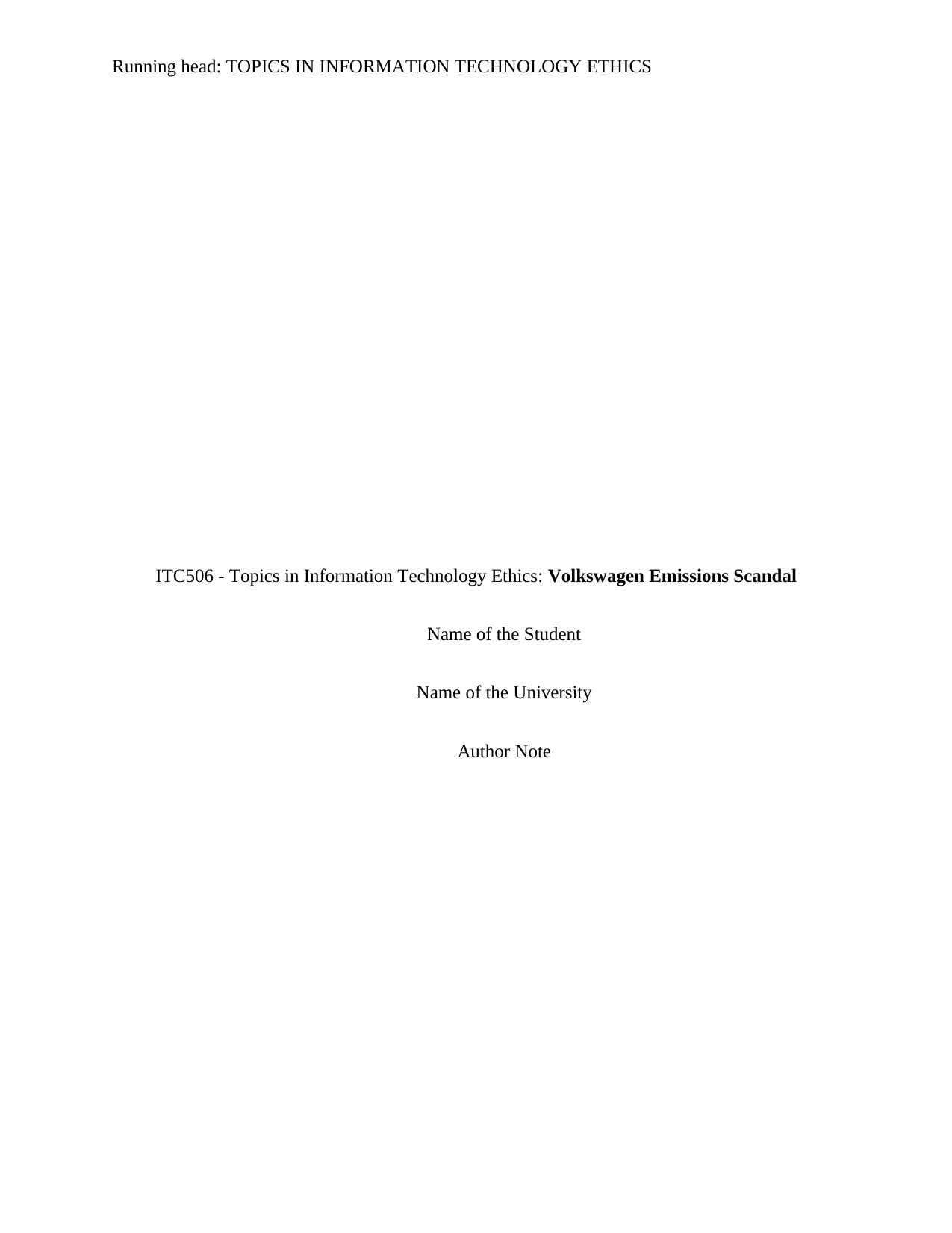
Running head: TOPICS IN INFORMATION TECHNOLOGY ETHICS
ITC506 - Topics in Information Technology Ethics: Volkswagen Emissions Scandal
Name of the Student
Name of the University
Author Note
ITC506 - Topics in Information Technology Ethics: Volkswagen Emissions Scandal
Name of the Student
Name of the University
Author Note
Paraphrase This Document
Need a fresh take? Get an instant paraphrase of this document with our AI Paraphraser
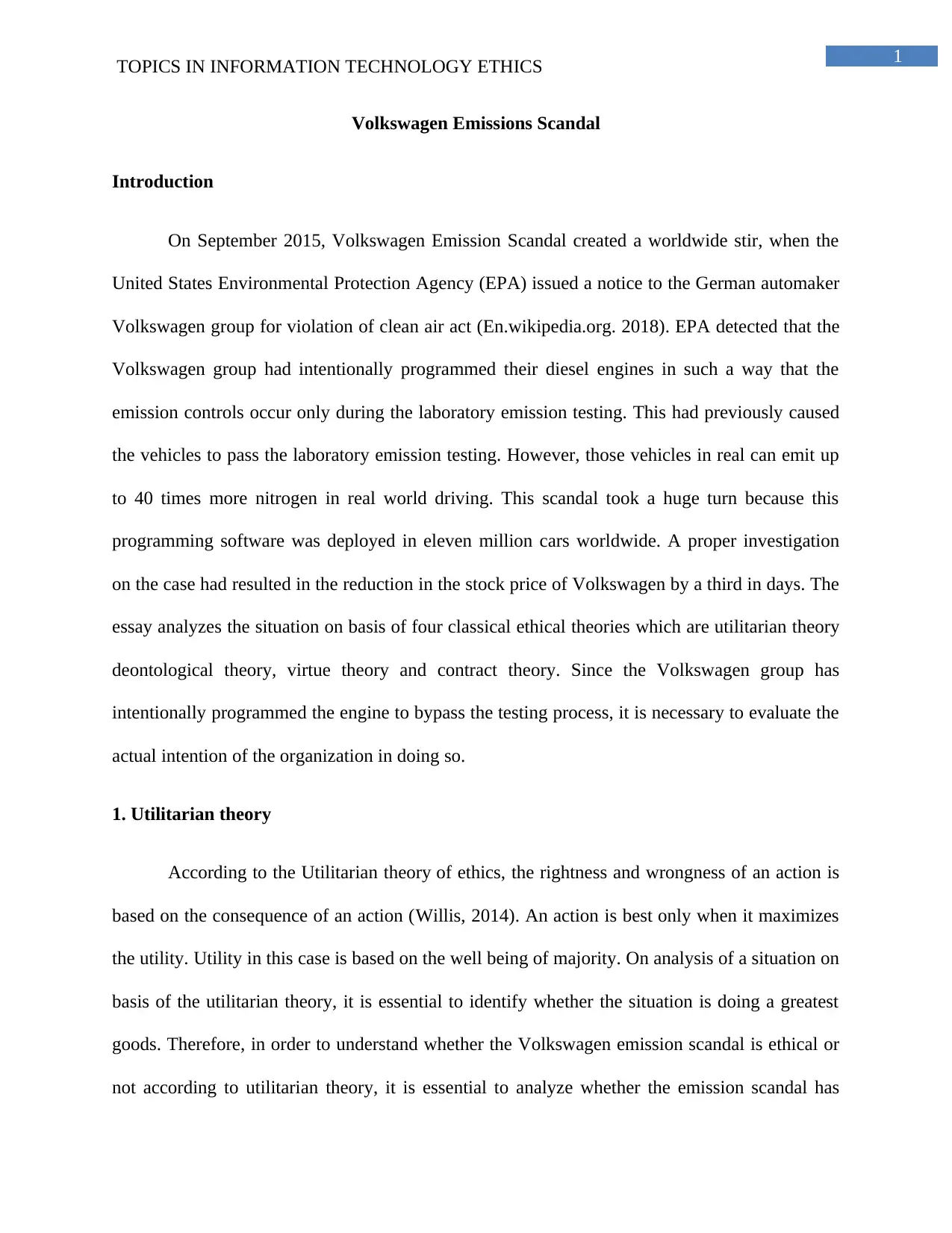
1
TOPICS IN INFORMATION TECHNOLOGY ETHICS
Volkswagen Emissions Scandal
Introduction
On September 2015, Volkswagen Emission Scandal created a worldwide stir, when the
United States Environmental Protection Agency (EPA) issued a notice to the German automaker
Volkswagen group for violation of clean air act (En.wikipedia.org. 2018). EPA detected that the
Volkswagen group had intentionally programmed their diesel engines in such a way that the
emission controls occur only during the laboratory emission testing. This had previously caused
the vehicles to pass the laboratory emission testing. However, those vehicles in real can emit up
to 40 times more nitrogen in real world driving. This scandal took a huge turn because this
programming software was deployed in eleven million cars worldwide. A proper investigation
on the case had resulted in the reduction in the stock price of Volkswagen by a third in days. The
essay analyzes the situation on basis of four classical ethical theories which are utilitarian theory
deontological theory, virtue theory and contract theory. Since the Volkswagen group has
intentionally programmed the engine to bypass the testing process, it is necessary to evaluate the
actual intention of the organization in doing so.
1. Utilitarian theory
According to the Utilitarian theory of ethics, the rightness and wrongness of an action is
based on the consequence of an action (Willis, 2014). An action is best only when it maximizes
the utility. Utility in this case is based on the well being of majority. On analysis of a situation on
basis of the utilitarian theory, it is essential to identify whether the situation is doing a greatest
goods. Therefore, in order to understand whether the Volkswagen emission scandal is ethical or
not according to utilitarian theory, it is essential to analyze whether the emission scandal has
TOPICS IN INFORMATION TECHNOLOGY ETHICS
Volkswagen Emissions Scandal
Introduction
On September 2015, Volkswagen Emission Scandal created a worldwide stir, when the
United States Environmental Protection Agency (EPA) issued a notice to the German automaker
Volkswagen group for violation of clean air act (En.wikipedia.org. 2018). EPA detected that the
Volkswagen group had intentionally programmed their diesel engines in such a way that the
emission controls occur only during the laboratory emission testing. This had previously caused
the vehicles to pass the laboratory emission testing. However, those vehicles in real can emit up
to 40 times more nitrogen in real world driving. This scandal took a huge turn because this
programming software was deployed in eleven million cars worldwide. A proper investigation
on the case had resulted in the reduction in the stock price of Volkswagen by a third in days. The
essay analyzes the situation on basis of four classical ethical theories which are utilitarian theory
deontological theory, virtue theory and contract theory. Since the Volkswagen group has
intentionally programmed the engine to bypass the testing process, it is necessary to evaluate the
actual intention of the organization in doing so.
1. Utilitarian theory
According to the Utilitarian theory of ethics, the rightness and wrongness of an action is
based on the consequence of an action (Willis, 2014). An action is best only when it maximizes
the utility. Utility in this case is based on the well being of majority. On analysis of a situation on
basis of the utilitarian theory, it is essential to identify whether the situation is doing a greatest
goods. Therefore, in order to understand whether the Volkswagen emission scandal is ethical or
not according to utilitarian theory, it is essential to analyze whether the emission scandal has
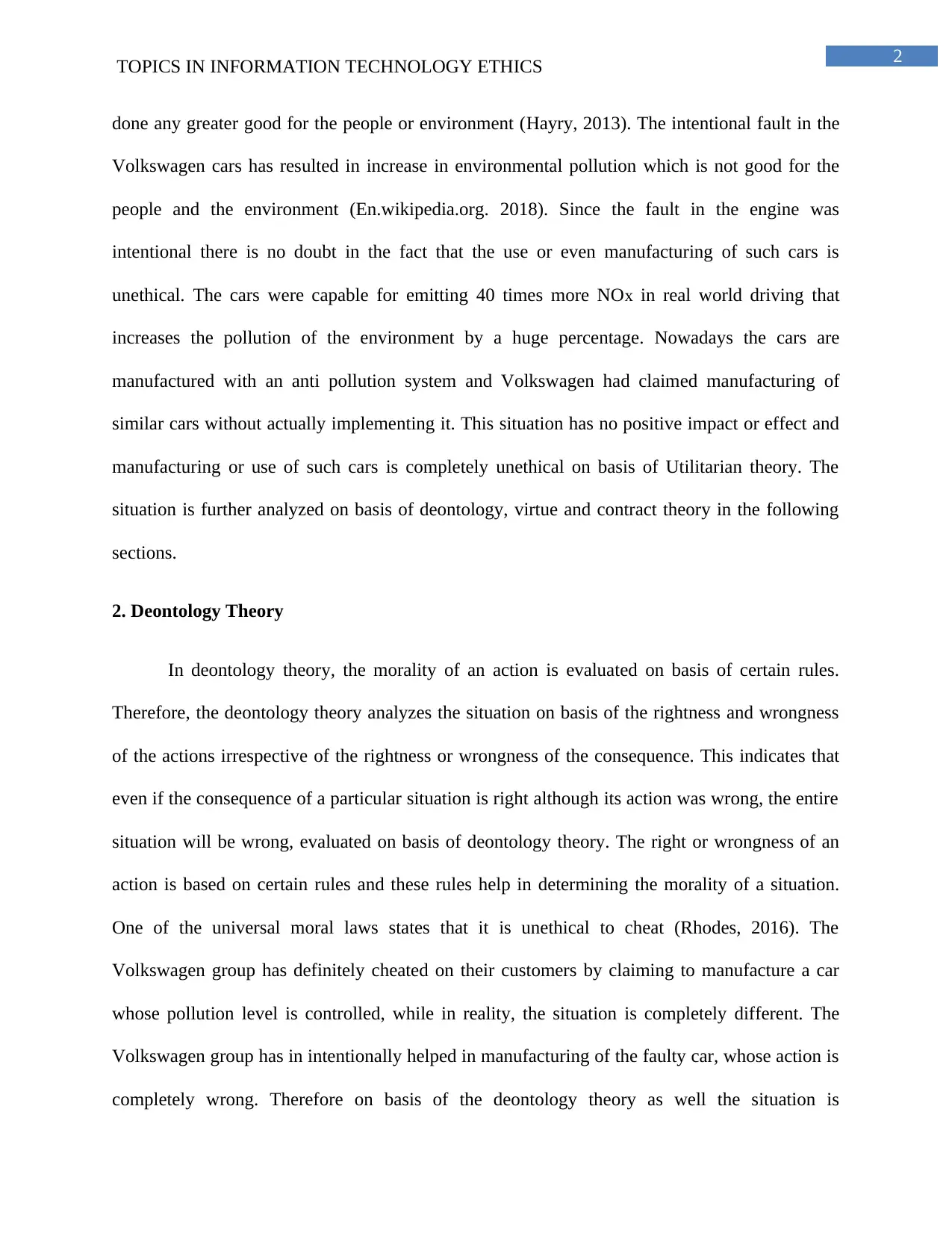
2
TOPICS IN INFORMATION TECHNOLOGY ETHICS
done any greater good for the people or environment (Hayry, 2013). The intentional fault in the
Volkswagen cars has resulted in increase in environmental pollution which is not good for the
people and the environment (En.wikipedia.org. 2018). Since the fault in the engine was
intentional there is no doubt in the fact that the use or even manufacturing of such cars is
unethical. The cars were capable for emitting 40 times more NOx in real world driving that
increases the pollution of the environment by a huge percentage. Nowadays the cars are
manufactured with an anti pollution system and Volkswagen had claimed manufacturing of
similar cars without actually implementing it. This situation has no positive impact or effect and
manufacturing or use of such cars is completely unethical on basis of Utilitarian theory. The
situation is further analyzed on basis of deontology, virtue and contract theory in the following
sections.
2. Deontology Theory
In deontology theory, the morality of an action is evaluated on basis of certain rules.
Therefore, the deontology theory analyzes the situation on basis of the rightness and wrongness
of the actions irrespective of the rightness or wrongness of the consequence. This indicates that
even if the consequence of a particular situation is right although its action was wrong, the entire
situation will be wrong, evaluated on basis of deontology theory. The right or wrongness of an
action is based on certain rules and these rules help in determining the morality of a situation.
One of the universal moral laws states that it is unethical to cheat (Rhodes, 2016). The
Volkswagen group has definitely cheated on their customers by claiming to manufacture a car
whose pollution level is controlled, while in reality, the situation is completely different. The
Volkswagen group has in intentionally helped in manufacturing of the faulty car, whose action is
completely wrong. Therefore on basis of the deontology theory as well the situation is
TOPICS IN INFORMATION TECHNOLOGY ETHICS
done any greater good for the people or environment (Hayry, 2013). The intentional fault in the
Volkswagen cars has resulted in increase in environmental pollution which is not good for the
people and the environment (En.wikipedia.org. 2018). Since the fault in the engine was
intentional there is no doubt in the fact that the use or even manufacturing of such cars is
unethical. The cars were capable for emitting 40 times more NOx in real world driving that
increases the pollution of the environment by a huge percentage. Nowadays the cars are
manufactured with an anti pollution system and Volkswagen had claimed manufacturing of
similar cars without actually implementing it. This situation has no positive impact or effect and
manufacturing or use of such cars is completely unethical on basis of Utilitarian theory. The
situation is further analyzed on basis of deontology, virtue and contract theory in the following
sections.
2. Deontology Theory
In deontology theory, the morality of an action is evaluated on basis of certain rules.
Therefore, the deontology theory analyzes the situation on basis of the rightness and wrongness
of the actions irrespective of the rightness or wrongness of the consequence. This indicates that
even if the consequence of a particular situation is right although its action was wrong, the entire
situation will be wrong, evaluated on basis of deontology theory. The right or wrongness of an
action is based on certain rules and these rules help in determining the morality of a situation.
One of the universal moral laws states that it is unethical to cheat (Rhodes, 2016). The
Volkswagen group has definitely cheated on their customers by claiming to manufacture a car
whose pollution level is controlled, while in reality, the situation is completely different. The
Volkswagen group has in intentionally helped in manufacturing of the faulty car, whose action is
completely wrong. Therefore on basis of the deontology theory as well the situation is
⊘ This is a preview!⊘
Do you want full access?
Subscribe today to unlock all pages.

Trusted by 1+ million students worldwide
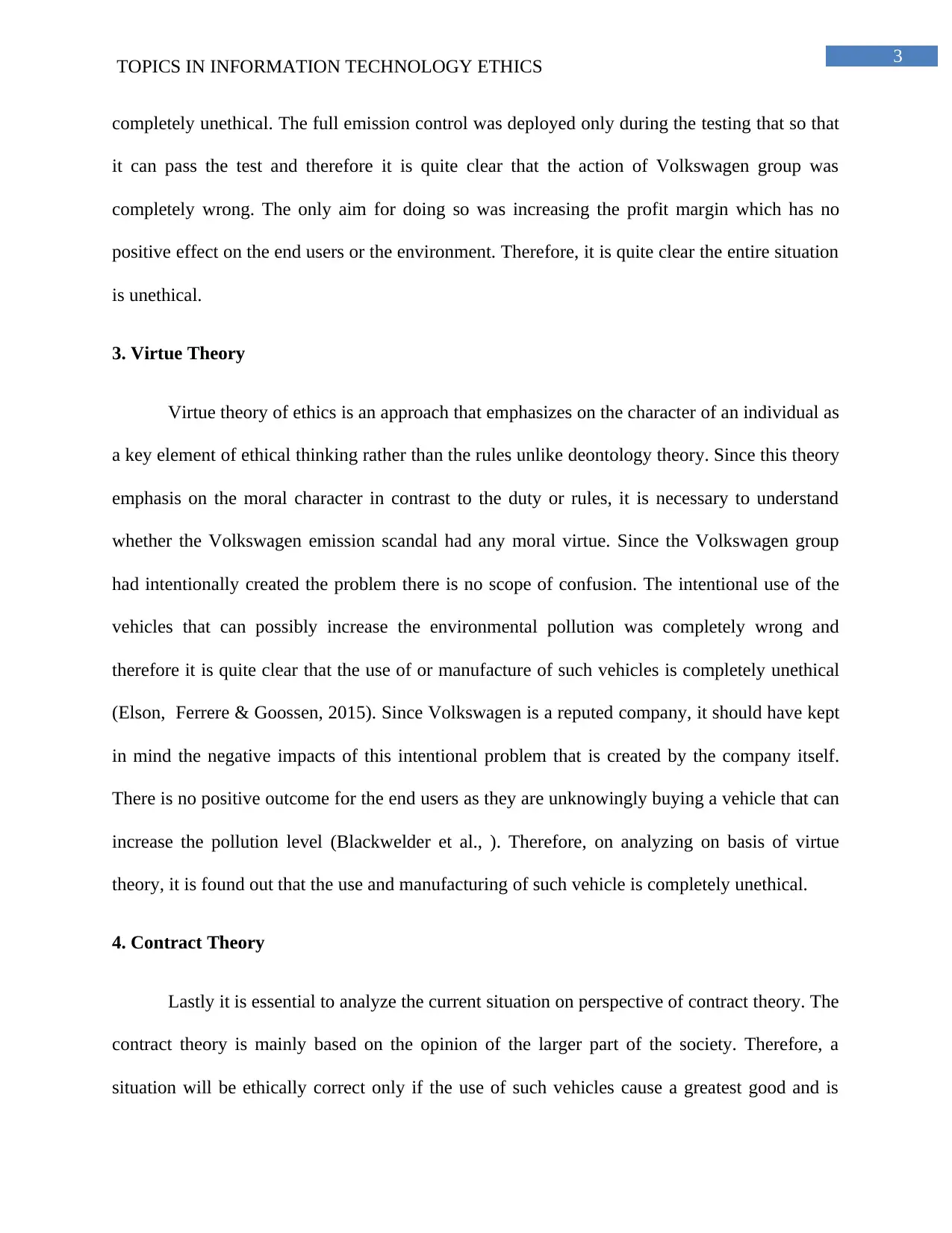
3
TOPICS IN INFORMATION TECHNOLOGY ETHICS
completely unethical. The full emission control was deployed only during the testing that so that
it can pass the test and therefore it is quite clear that the action of Volkswagen group was
completely wrong. The only aim for doing so was increasing the profit margin which has no
positive effect on the end users or the environment. Therefore, it is quite clear the entire situation
is unethical.
3. Virtue Theory
Virtue theory of ethics is an approach that emphasizes on the character of an individual as
a key element of ethical thinking rather than the rules unlike deontology theory. Since this theory
emphasis on the moral character in contrast to the duty or rules, it is necessary to understand
whether the Volkswagen emission scandal had any moral virtue. Since the Volkswagen group
had intentionally created the problem there is no scope of confusion. The intentional use of the
vehicles that can possibly increase the environmental pollution was completely wrong and
therefore it is quite clear that the use of or manufacture of such vehicles is completely unethical
(Elson, Ferrere & Goossen, 2015). Since Volkswagen is a reputed company, it should have kept
in mind the negative impacts of this intentional problem that is created by the company itself.
There is no positive outcome for the end users as they are unknowingly buying a vehicle that can
increase the pollution level (Blackwelder et al., ). Therefore, on analyzing on basis of virtue
theory, it is found out that the use and manufacturing of such vehicle is completely unethical.
4. Contract Theory
Lastly it is essential to analyze the current situation on perspective of contract theory. The
contract theory is mainly based on the opinion of the larger part of the society. Therefore, a
situation will be ethically correct only if the use of such vehicles cause a greatest good and is
TOPICS IN INFORMATION TECHNOLOGY ETHICS
completely unethical. The full emission control was deployed only during the testing that so that
it can pass the test and therefore it is quite clear that the action of Volkswagen group was
completely wrong. The only aim for doing so was increasing the profit margin which has no
positive effect on the end users or the environment. Therefore, it is quite clear the entire situation
is unethical.
3. Virtue Theory
Virtue theory of ethics is an approach that emphasizes on the character of an individual as
a key element of ethical thinking rather than the rules unlike deontology theory. Since this theory
emphasis on the moral character in contrast to the duty or rules, it is necessary to understand
whether the Volkswagen emission scandal had any moral virtue. Since the Volkswagen group
had intentionally created the problem there is no scope of confusion. The intentional use of the
vehicles that can possibly increase the environmental pollution was completely wrong and
therefore it is quite clear that the use of or manufacture of such vehicles is completely unethical
(Elson, Ferrere & Goossen, 2015). Since Volkswagen is a reputed company, it should have kept
in mind the negative impacts of this intentional problem that is created by the company itself.
There is no positive outcome for the end users as they are unknowingly buying a vehicle that can
increase the pollution level (Blackwelder et al., ). Therefore, on analyzing on basis of virtue
theory, it is found out that the use and manufacturing of such vehicle is completely unethical.
4. Contract Theory
Lastly it is essential to analyze the current situation on perspective of contract theory. The
contract theory is mainly based on the opinion of the larger part of the society. Therefore, a
situation will be ethically correct only if the use of such vehicles cause a greatest good and is
Paraphrase This Document
Need a fresh take? Get an instant paraphrase of this document with our AI Paraphraser
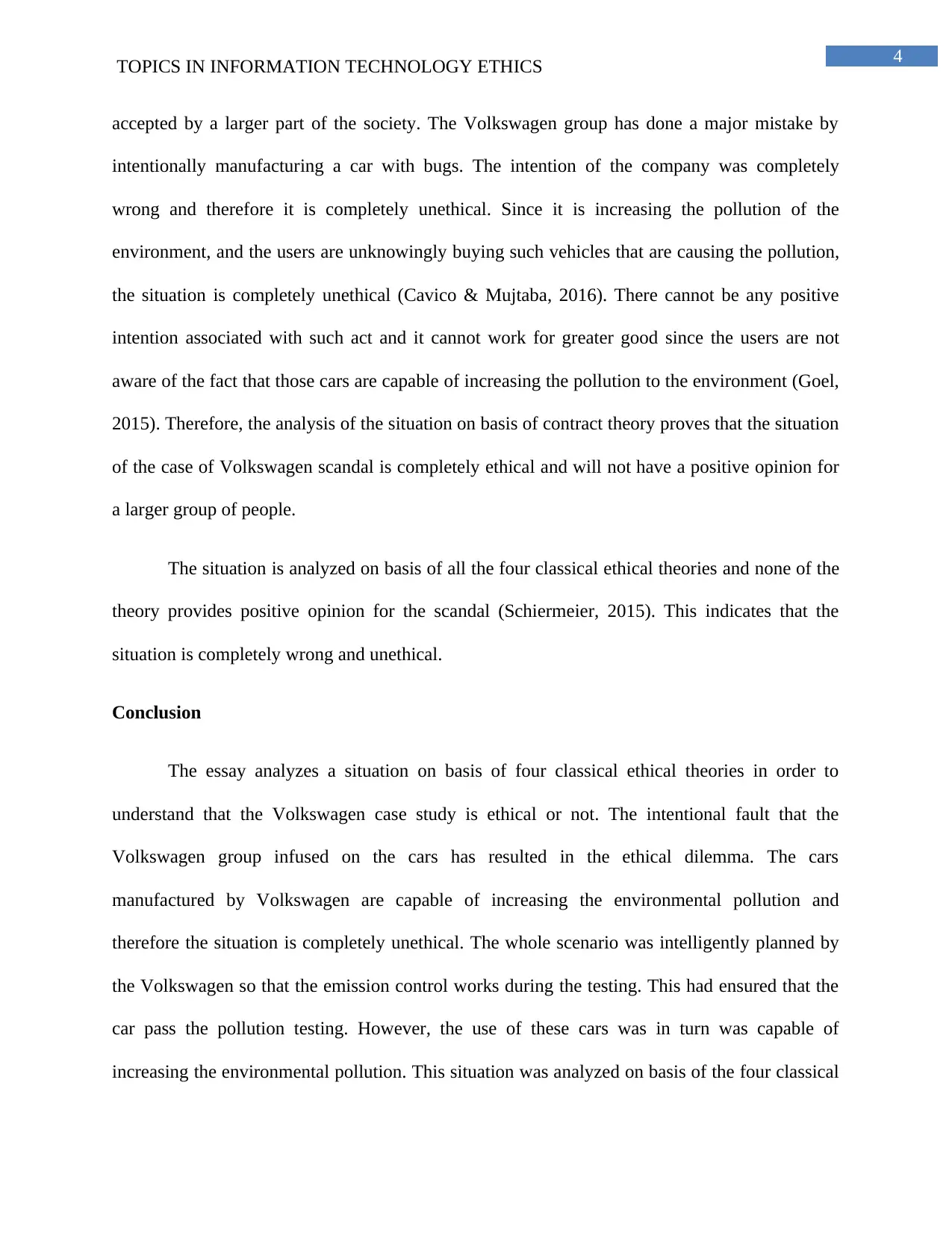
4
TOPICS IN INFORMATION TECHNOLOGY ETHICS
accepted by a larger part of the society. The Volkswagen group has done a major mistake by
intentionally manufacturing a car with bugs. The intention of the company was completely
wrong and therefore it is completely unethical. Since it is increasing the pollution of the
environment, and the users are unknowingly buying such vehicles that are causing the pollution,
the situation is completely unethical (Cavico & Mujtaba, 2016). There cannot be any positive
intention associated with such act and it cannot work for greater good since the users are not
aware of the fact that those cars are capable of increasing the pollution to the environment (Goel,
2015). Therefore, the analysis of the situation on basis of contract theory proves that the situation
of the case of Volkswagen scandal is completely ethical and will not have a positive opinion for
a larger group of people.
The situation is analyzed on basis of all the four classical ethical theories and none of the
theory provides positive opinion for the scandal (Schiermeier, 2015). This indicates that the
situation is completely wrong and unethical.
Conclusion
The essay analyzes a situation on basis of four classical ethical theories in order to
understand that the Volkswagen case study is ethical or not. The intentional fault that the
Volkswagen group infused on the cars has resulted in the ethical dilemma. The cars
manufactured by Volkswagen are capable of increasing the environmental pollution and
therefore the situation is completely unethical. The whole scenario was intelligently planned by
the Volkswagen so that the emission control works during the testing. This had ensured that the
car pass the pollution testing. However, the use of these cars was in turn was capable of
increasing the environmental pollution. This situation was analyzed on basis of the four classical
TOPICS IN INFORMATION TECHNOLOGY ETHICS
accepted by a larger part of the society. The Volkswagen group has done a major mistake by
intentionally manufacturing a car with bugs. The intention of the company was completely
wrong and therefore it is completely unethical. Since it is increasing the pollution of the
environment, and the users are unknowingly buying such vehicles that are causing the pollution,
the situation is completely unethical (Cavico & Mujtaba, 2016). There cannot be any positive
intention associated with such act and it cannot work for greater good since the users are not
aware of the fact that those cars are capable of increasing the pollution to the environment (Goel,
2015). Therefore, the analysis of the situation on basis of contract theory proves that the situation
of the case of Volkswagen scandal is completely ethical and will not have a positive opinion for
a larger group of people.
The situation is analyzed on basis of all the four classical ethical theories and none of the
theory provides positive opinion for the scandal (Schiermeier, 2015). This indicates that the
situation is completely wrong and unethical.
Conclusion
The essay analyzes a situation on basis of four classical ethical theories in order to
understand that the Volkswagen case study is ethical or not. The intentional fault that the
Volkswagen group infused on the cars has resulted in the ethical dilemma. The cars
manufactured by Volkswagen are capable of increasing the environmental pollution and
therefore the situation is completely unethical. The whole scenario was intelligently planned by
the Volkswagen so that the emission control works during the testing. This had ensured that the
car pass the pollution testing. However, the use of these cars was in turn was capable of
increasing the environmental pollution. This situation was analyzed on basis of the four classical
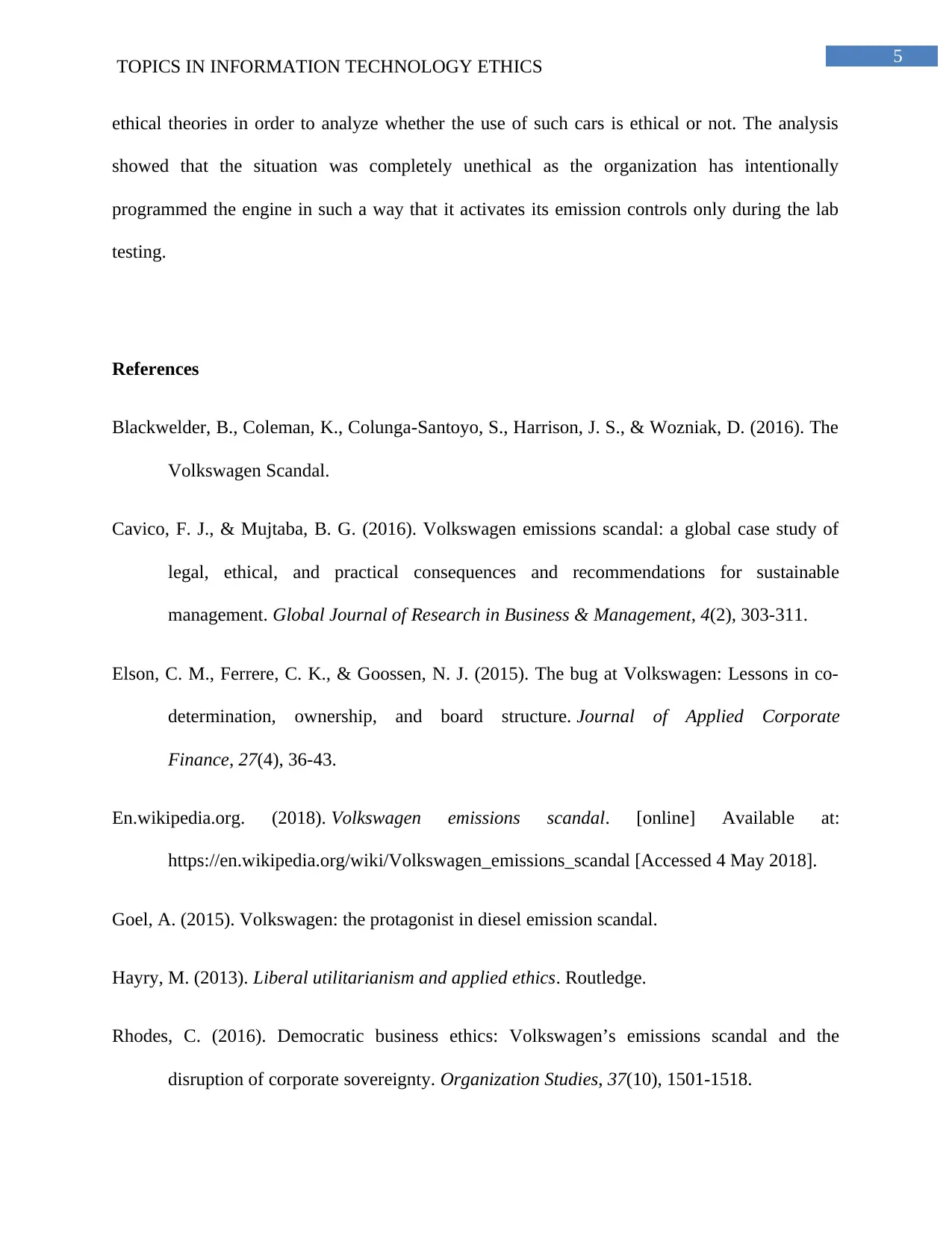
5
TOPICS IN INFORMATION TECHNOLOGY ETHICS
ethical theories in order to analyze whether the use of such cars is ethical or not. The analysis
showed that the situation was completely unethical as the organization has intentionally
programmed the engine in such a way that it activates its emission controls only during the lab
testing.
References
Blackwelder, B., Coleman, K., Colunga-Santoyo, S., Harrison, J. S., & Wozniak, D. (2016). The
Volkswagen Scandal.
Cavico, F. J., & Mujtaba, B. G. (2016). Volkswagen emissions scandal: a global case study of
legal, ethical, and practical consequences and recommendations for sustainable
management. Global Journal of Research in Business & Management, 4(2), 303-311.
Elson, C. M., Ferrere, C. K., & Goossen, N. J. (2015). The bug at Volkswagen: Lessons in co‐
determination, ownership, and board structure. Journal of Applied Corporate
Finance, 27(4), 36-43.
En.wikipedia.org. (2018). Volkswagen emissions scandal. [online] Available at:
https://en.wikipedia.org/wiki/Volkswagen_emissions_scandal [Accessed 4 May 2018].
Goel, A. (2015). Volkswagen: the protagonist in diesel emission scandal.
Hayry, M. (2013). Liberal utilitarianism and applied ethics. Routledge.
Rhodes, C. (2016). Democratic business ethics: Volkswagen’s emissions scandal and the
disruption of corporate sovereignty. Organization Studies, 37(10), 1501-1518.
TOPICS IN INFORMATION TECHNOLOGY ETHICS
ethical theories in order to analyze whether the use of such cars is ethical or not. The analysis
showed that the situation was completely unethical as the organization has intentionally
programmed the engine in such a way that it activates its emission controls only during the lab
testing.
References
Blackwelder, B., Coleman, K., Colunga-Santoyo, S., Harrison, J. S., & Wozniak, D. (2016). The
Volkswagen Scandal.
Cavico, F. J., & Mujtaba, B. G. (2016). Volkswagen emissions scandal: a global case study of
legal, ethical, and practical consequences and recommendations for sustainable
management. Global Journal of Research in Business & Management, 4(2), 303-311.
Elson, C. M., Ferrere, C. K., & Goossen, N. J. (2015). The bug at Volkswagen: Lessons in co‐
determination, ownership, and board structure. Journal of Applied Corporate
Finance, 27(4), 36-43.
En.wikipedia.org. (2018). Volkswagen emissions scandal. [online] Available at:
https://en.wikipedia.org/wiki/Volkswagen_emissions_scandal [Accessed 4 May 2018].
Goel, A. (2015). Volkswagen: the protagonist in diesel emission scandal.
Hayry, M. (2013). Liberal utilitarianism and applied ethics. Routledge.
Rhodes, C. (2016). Democratic business ethics: Volkswagen’s emissions scandal and the
disruption of corporate sovereignty. Organization Studies, 37(10), 1501-1518.
⊘ This is a preview!⊘
Do you want full access?
Subscribe today to unlock all pages.

Trusted by 1+ million students worldwide
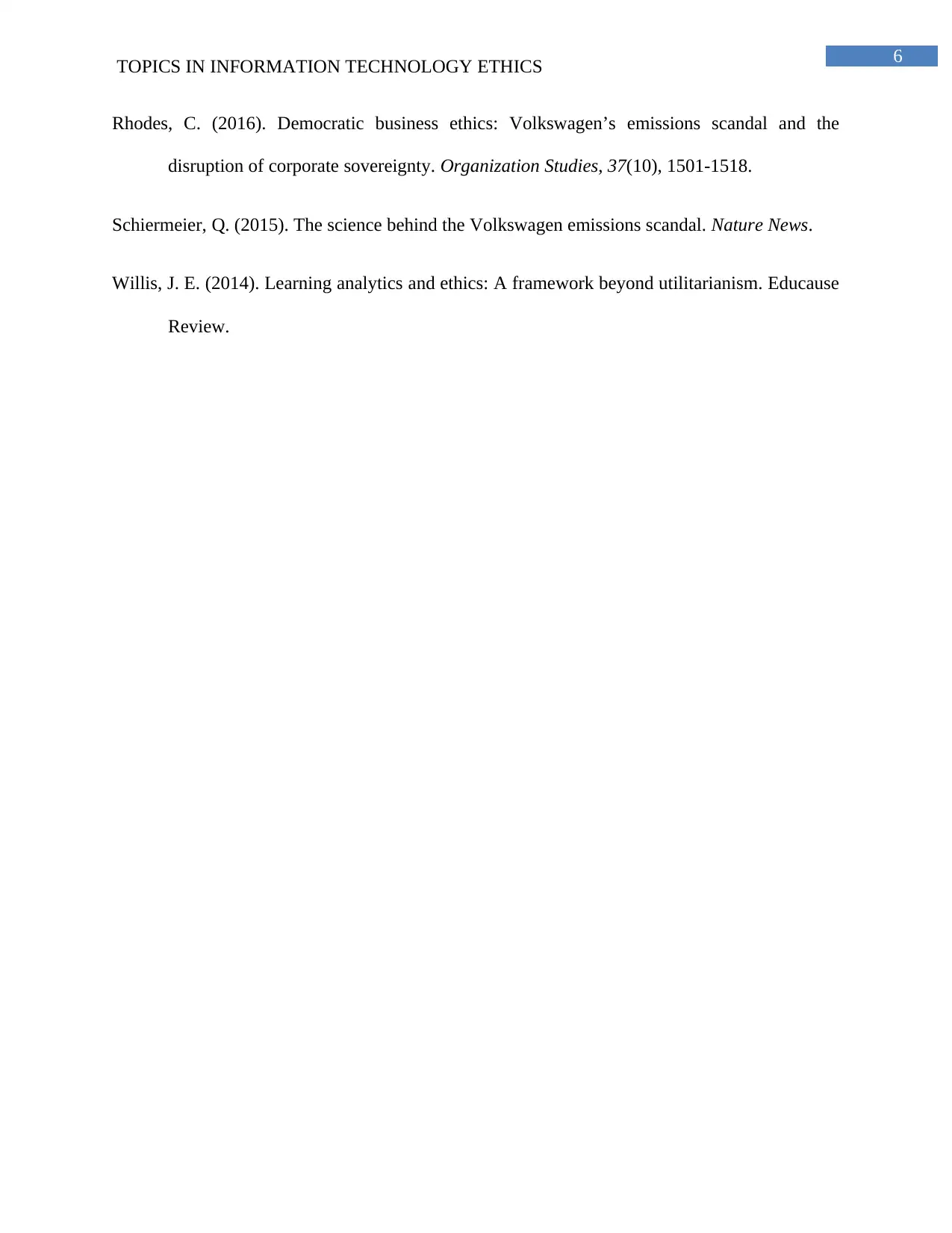
6
TOPICS IN INFORMATION TECHNOLOGY ETHICS
Rhodes, C. (2016). Democratic business ethics: Volkswagen’s emissions scandal and the
disruption of corporate sovereignty. Organization Studies, 37(10), 1501-1518.
Schiermeier, Q. (2015). The science behind the Volkswagen emissions scandal. Nature News.
Willis, J. E. (2014). Learning analytics and ethics: A framework beyond utilitarianism. Educause
Review.
TOPICS IN INFORMATION TECHNOLOGY ETHICS
Rhodes, C. (2016). Democratic business ethics: Volkswagen’s emissions scandal and the
disruption of corporate sovereignty. Organization Studies, 37(10), 1501-1518.
Schiermeier, Q. (2015). The science behind the Volkswagen emissions scandal. Nature News.
Willis, J. E. (2014). Learning analytics and ethics: A framework beyond utilitarianism. Educause
Review.
1 out of 7
Related Documents
Your All-in-One AI-Powered Toolkit for Academic Success.
+13062052269
info@desklib.com
Available 24*7 on WhatsApp / Email
![[object Object]](/_next/static/media/star-bottom.7253800d.svg)
Unlock your academic potential
Copyright © 2020–2026 A2Z Services. All Rights Reserved. Developed and managed by ZUCOL.




